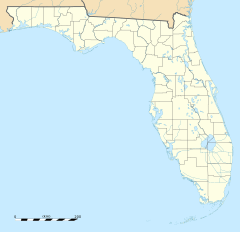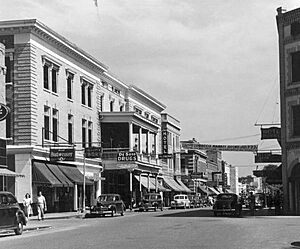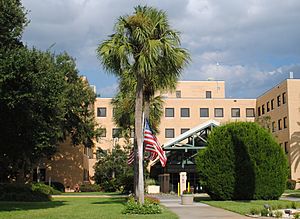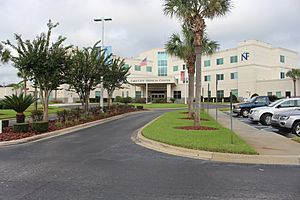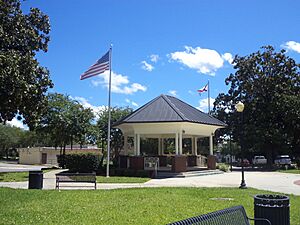Lake City, Florida facts for kids
Quick facts for kids
Lake City, Florida
|
|
|---|---|
| City of Lake City | |
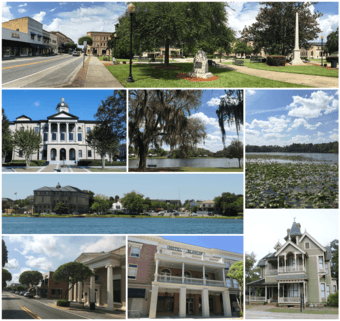
Top, left to right: Downtown Lake City, Columbia County Courthouse, Lake Isabella, Lake Montgomery, Lake DeSoto, 1912 Columbia County Bank building, Hotel Blanche, T. G. Henderson House
|
|
| Nickname(s):
The Gateway to Florida
|
|
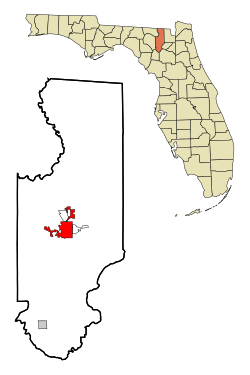
Location in Columbia County and the state of Florida
|
|
| Country | |
| State | |
| County | Columbia |
| Settled | 1821 |
| Incorporated | 1859 |
| Government | |
| • Type | Council-Manager |
| Area | |
| • City | 12.25 sq mi (31.73 km2) |
| • Land | 11.85 sq mi (30.69 km2) |
| • Water | 0.40 sq mi (1.04 km2) 3.20% |
| Elevation | 197 ft (60 m) |
| Population
(2020)
|
|
| • City | 12,329 |
| • Density | 1,040.60/sq mi (401.79/km2) |
| • Metro | 67,531 |
| Time zone | UTC−5 (EST) |
| • Summer (DST) | UTC−4 (EDT) |
| ZIP code |
32024-32025, 32055-32056
|
| Area code(s) | 386 |
| FIPS code | 12-37775 |
| GNIS feature ID | 0305917 |
Lake City is a city in Florida, United States. It is the main city of Columbia County, Florida. In 2020, about 12,329 people lived there. Lake City is often called "The Gateway to Florida." This is because it's located near where two major highways, Interstate 75 and Interstate 10, meet.
The city started in 1821 as a town called Alligator. It was near a Seminole village also called Alligator. In 1858, Alligator became an official city and was renamed Lake City. A big battle during the American Civil War, called the Battle of Olustee, happened near Lake City in 1864. Today, Lake City is home to Lake City Gateway Airport and Florida Gateway College.
Contents
History of Lake City
Early Settlements and Native Americans
In 1539, a Spanish explorer named Hernando de Soto came to Florida. His group traveled north, looking for gold. They met a large group of Native Americans called the northern Utina. These people were part of the Timucua tribe. Spanish missionaries later built missions in this area. They wanted to grow crops and connect with the Native Americans.
Alligator Village and Town
In the 1700s, a Seminole village called Alligator Village was here. We don't know exactly when it started. But the U.S. Army wrote about it in 1821. A famous leader from this village was Alligator Warrior. He led Seminole fighters in the Second Seminole War. This war was fought to stop their people from being moved away.
After Florida became a U.S. territory in 1821, American settlers started their own town. They built it next to Alligator Village and called it Alligator. The Seminole people later moved away. In 1832, Alligator Town became the main town for Columbia County.
During the Seminole Wars, forts were built nearby. One was Fort Alligator, right in today's downtown Lake City. By 1845, most Seminole people had left the area. In 1858, a railroad line was finished. It connected Jacksonville to Alligator. This helped the town grow with more trade and visitors. Alligator Town officially became a city in 1859. It was renamed Lake City.
Lake City During the Civil War
During the American Civil War, the railroad was important. It carried food and salt to Confederate soldiers. In 1862, soldiers from Lake City joined the 8th Florida Infantry Regiment. They went to fight in Virginia.
In February 1864, Union troops moved towards Lake City. They wanted to stop Confederate supplies. Confederate General Joseph Finnegan gathered his soldiers. On February 11, 1864, his troops stopped a Union attack in Lake City. Finnegan then moved his forces to Olustee Station, east of Lake City.
The Union and Confederate armies fought the Battle of Olustee on February 20, 1864. This was the only big battle in Florida during the war. Many soldiers were hurt or killed on both sides. The Confederate soldiers who died were buried in Lake City. In 1928, a memorial was built in downtown Lake City to remember the battle.
After the war, Florida's railroads were damaged. The railroad in Lake City was rebuilt. In 1874, a fire destroyed most of the wooden buildings in Lake City.
Growth of Modern Lake City
In 1874, Lake City got its first newspaper, the Lake City Reporter. In 1891, Lake City was the first city in Florida to have electric lights. By the early 1900s, Lake City was a key railroad hub. Many different train lines met there. The Hotel Blanche was built in 1902 for tourists. It was the main hotel in Lake City for many years.
A college called Florida Agricultural College started in Lake City in 1884. It later moved to Gainesville in 1905. It became part of the University of Florida. In 1907, another college, Columbia College, opened in Lake City. It closed after ten years. During World War I, the college campus was used to train soldiers. It later became a hospital for veterans.
During World War II, Lake City helped with the war effort. A new hospital, Lake Shore Hospital, opened in 1940. The Lake City Woman's Club became a United Service Organizations (USO) center. It entertained soldiers stationed in Lake City. A naval air station, NAS Lake City, opened in 1942. It trained pilots. Military flights stopped there in 1946.
After World War II, the air base became the Columbia Forestry School. This school later became Florida Gateway College in 2010. By 1950, the city's population was 7,571. Making wood products like lumber became very important to the local economy.
In 1958, the Columbia Amateur Radio Society started. This group of amateur radio operators could talk to people all over the world. Lake City celebrated its 100th birthday in 1959. There were parades and fireworks.
In 1963, the major highways Interstate 75 and Interstate 10 opened. They cross paths in Lake City. In 1970, a judge ordered all public schools in Columbia County to allow students of all races to attend together. In the 1990s, downtown Lake City was improved with new shops and restaurants. In 2019, Lake City had a cyber attack that affected its computer systems.
Geography and Climate
Lake City is in northern Florida. It's located where Interstate 10 and Interstate 75 meet. Jacksonville is about 60 miles (97 km) to the east. Tallahassee is about 106 miles (171 km) to the west. Gainesville is about 46 miles (74 km) to the south.
Lake City covers about 12.25 square miles (31.73 square kilometers). Most of this area is land. About 3.2% of the city is water.
Climate in Lake City
Lake City has a humid subtropical climate. This means it has hot, humid summers and mild winters. Sometimes, cold air from the continent can reach Lake City. This can cause rare cold spells. The hottest temperature ever recorded was 106°F (41°C) on June 4, 1918. The coldest was 6°F (-14°C) on February 13, 1899.
| Climate data for Lake City, Florida, 1991–2020 normals, extremes 1892–present | |||||||||||||
|---|---|---|---|---|---|---|---|---|---|---|---|---|---|
| Month | Jan | Feb | Mar | Apr | May | Jun | Jul | Aug | Sep | Oct | Nov | Dec | Year |
| Record high °F (°C) | 90 (32) |
89 (32) |
94 (34) |
96 (36) |
101 (38) |
106 (41) |
102 (39) |
104 (40) |
101 (38) |
96 (36) |
91 (33) |
91 (33) |
106 (41) |
| Mean maximum °F (°C) | 79.3 (26.3) |
81.8 (27.7) |
85.1 (29.5) |
89.2 (31.8) |
93.9 (34.4) |
96.8 (36.0) |
96.7 (35.9) |
95.5 (35.3) |
93.1 (33.9) |
89.0 (31.7) |
84.3 (29.1) |
80.4 (26.9) |
97.9 (36.6) |
| Mean daily maximum °F (°C) | 63.2 (17.3) |
67.0 (19.4) |
73.1 (22.8) |
78.7 (25.9) |
85.2 (29.6) |
88.3 (31.3) |
89.7 (32.1) |
88.8 (31.6) |
86.0 (30.0) |
79.4 (26.3) |
71.3 (21.8) |
65.5 (18.6) |
78.0 (25.6) |
| Daily mean °F (°C) | 52.1 (11.2) |
55.5 (13.1) |
60.8 (16.0) |
66.6 (19.2) |
73.4 (23.0) |
78.2 (25.7) |
80.0 (26.7) |
79.6 (26.4) |
76.6 (24.8) |
69.0 (20.6) |
60.2 (15.7) |
54.5 (12.5) |
67.2 (19.6) |
| Mean daily minimum °F (°C) | 40.9 (4.9) |
44.0 (6.7) |
48.6 (9.2) |
54.5 (12.5) |
61.6 (16.4) |
68.1 (20.1) |
70.3 (21.3) |
70.4 (21.3) |
67.3 (19.6) |
58.6 (14.8) |
49.1 (9.5) |
43.5 (6.4) |
56.4 (13.6) |
| Mean minimum °F (°C) | 25.1 (−3.8) |
28.4 (−2.0) |
33.9 (1.1) |
42.2 (5.7) |
51.6 (10.9) |
63.2 (17.3) |
67.2 (19.6) |
67.6 (19.8) |
60.4 (15.8) |
44.7 (7.1) |
33.2 (0.7) |
28.6 (−1.9) |
23.3 (−4.8) |
| Record low °F (°C) | 7 (−14) |
6 (−14) |
19 (−7) |
33 (1) |
41 (5) |
49 (9) |
57 (14) |
59 (15) |
44 (7) |
32 (0) |
18 (−8) |
9 (−13) |
6 (−14) |
| Average precipitation inches (mm) | 4.27 (108) |
3.23 (82) |
4.29 (109) |
3.55 (90) |
3.47 (88) |
7.55 (192) |
7.16 (182) |
7.28 (185) |
5.86 (149) |
2.50 (64) |
1.91 (49) |
2.91 (74) |
53.98 (1,371) |
| Average precipitation days (≥ 0.01 in) | 11.2 | 9.0 | 9.0 | 7.4 | 7.0 | 14.7 | 15.7 | 17.0 | 11.5 | 8.3 | 7.4 | 9.9 | 128.1 |
| Source: NOAA | |||||||||||||
People and Population
| Historical population | |||
|---|---|---|---|
| Census | Pop. | %± | |
| 1850 | 131 | — | |
| 1860 | 659 | 403.1% | |
| 1870 | 964 | 46.3% | |
| 1880 | 1,379 | 43.0% | |
| 1890 | 2,020 | 46.5% | |
| 1900 | 4,013 | 98.7% | |
| 1910 | 5,032 | 25.4% | |
| 1920 | 3,341 | −33.6% | |
| 1930 | 4,416 | 32.2% | |
| 1940 | 5,836 | 32.2% | |
| 1950 | 7,571 | 29.7% | |
| 1960 | 9,465 | 25.0% | |
| 1970 | 10,575 | 11.7% | |
| 1980 | 9,257 | −12.5% | |
| 1990 | 10,005 | 8.1% | |
| 2000 | 9,980 | −0.2% | |
| 2010 | 12,046 | 20.7% | |
| 2020 | 12,329 | 2.3% | |
| U.S. Decennial Census | |||
Lake City first appeared in the 1850 U.S. Census as "Alligator." It had 131 people then. By 2020, the population had grown to 12,329.
| Race | Pop 2010 | Pop 2020 | % 2010 | % 2020 |
|---|---|---|---|---|
| White (NH) | 6,453 | 5,886 | 53.57% | 47.74% |
| Black or African American (NH) | 4,432 | 4,312 | 36.79% | 34.97% |
| Native American or Alaska Native (NH) | 47 | 37 | 0.39% | 0.30% |
| Asian (NH) | 192 | 314 | 1.59% | 2.55% |
| Pacific Islander or Native Hawaiian (NH) | 0 | 9 | 0.00% | 0.07% |
| Some other race (NH) | 25 | 91 | 0.21% | 0.74% |
| Two or more races/Multiracial (NH) | 247 | 493 | 2.05% | 4.00% |
| Hispanic or Latino (any race) | 650 | 1,187 | 5.40% | 9.63% |
| Total | 12,046 | 12,329 | 100.00% | 100.00% |
In 2020, there were 12,329 people living in Lake City. They lived in 4,569 households.
Religion in Lake City
About 40% of people in Lake City are part of a religion. The largest group is Evangelicalism. Other groups include Protestant, Black Protestantism, and Catholicism.
Economy and Jobs
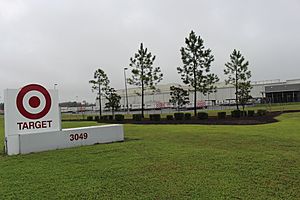
Lake City is known as "The Gateway to Florida." This is because Interstate 75 and Interstate 10 meet here. These highways bring a lot of tourists and businesses through the city. Lake City relies on travelers for much of its economy.
The city is also home to the main offices for the Osceola National Forest. Since 2000, several large companies have opened in Lake City. These include Hunter Panels, New Millennium, and United States Cold Storage. Target built a food distribution center here in 2008.
In 2011, the top employers in Lake City included:
| Rank | Company name | Business description | # Employees |
|---|---|---|---|
| 1 | Columbia County School System | Education | 1,400 |
| 2 | VA Medical Center | Healthcare | 1,200 |
| 3 | Anderson Columbia Co., Inc. | Asphalt/Paving | 775 |
| 4 | PCS Phosphate | Manufacturer | 706 |
| 5 | HAECO | Aircraft Maintenance | 635 |
| 6 | Wal-Mart Supercenter | Retail Sales | 505 |
| 7 | Lake City Medical Center | Healthcare | 430 |
| 8 | Sitel | Call Center | 358 |
| 9 | Shands at Lake Shore | Healthcare | 353 |
| 10 | CCA - Lake City Correctional Facility | Correctional Facility | 279 |
| 11 | City of Lake City | Government | 260 |
| 12 | S&S Food Stores | Convenience Stores | 249 |
| 13 | Columbia County Manager | Government | 248 |
| 14 | Florida Gateway College | Education | 225 |
| 15 | Health Care Center of Lake City | Healthcare | 163 |
| 16 | Publix Super Markets, Inc. | Grocery Stores | 151 |
| 17 | Corbitt Manufacturing Co., Inc. | Manufacturer | 115 |
| 18 | New Millennium | Manufacturer | 82 |
| 19 | Target Food Distribution Center | Distribution | 78 |
Arts and Culture
Olustee Battle Festival
Every February, Lake City hosts the Olustee Battle Festival. It lasts for three days. The festival includes a reenactment of the Battle of Olustee. It starts with a memorial service at Oak Lawn Cemetery. This service honors soldiers from both sides of the battle. The festival ends with the reenactment at the Olustee Battlefield Historic State Park. There are also live shows and exhibits in downtown Lake City.
Alligator Warrior Festival
The Alligator Warrior Festival happens every October. It celebrates the early history of Columbia County. The first festival was in 1995. Since 2010, it has been held at O'Leno State Park. This park has space for a full battle reenactment and large crowds.
Parks and Recreation
Lake City has many parks and outdoor areas for fun:
- Alligator Lake Park
- Falling Creek Falls
- Olustee Park
- Wilson Park
- Osceola National Park
- Southside Sports Complex
- Youngs Park
Education in Lake City
The Columbia County School District runs all the public schools in the county. It has nine elementary schools, three middle schools, and two high schools. Lake City also has a college, Florida Gateway College. This college offers two-year and four-year degrees.
Transportation
Airport
The Lake City Gateway Airport is important for local business. It's a general aviation airport. This means it's mostly for private planes and smaller aircraft. However, two unique operations happen here. HAECO works on large civilian and military aircraft. The U.S. Forest Service uses C-130 planes from here. They help fight forest fires in the southeastern United States.
Major Highways
Lake City is connected by several important highways:
 Interstate 75
Interstate 75 Interstate 10
Interstate 10 U.S. Route 90
U.S. Route 90 U.S. Route 41
U.S. Route 41 U.S. Route 441
U.S. Route 441
Railroad Service
Lake City used to be a stop for Amtrak's Sunset Limited train. This train traveled between Los Angeles and Orlando. Service stopped in 2005 because of damage from Hurricane Katrina. Today, freight trains use the lines. The Florida Gulf & Atlantic Railroad provides this service.
Famous People from Lake City
Many notable people have come from Lake City:
- Brian Allen, NFL linebacker
- Blayne Barber, PGA golf player
- Jerome Carter, NFL safety
- Fred P. Cone, 27th Governor of Florida
- Grace Elizabeth, model
- Shayne Edge, former Florida Gators and Pittsburgh Steelers punter
- Yatil Green, NFL wide receiver
- Harold Hart, NFL player
- Bertram Herlong, bishop
- Timmy Jernigan, NFL defensive tackle
- Michael Kirkman, MLB pitcher
- Trey Marshall, NFL safety
- Martha Mier, pianist and composer
- Dwight Stansel, state representative
- John Franklin Stewart, MLB player
- Pat Summerall, NFL placekicker and sportscaster
- Jasin Todd, former Shinedown guitarist
- Laremy Tunsil, NFL offensive lineman
- Reinard Wilson, NFL linebacker
- Chubby Wise, fiddler
- Susie Wiles, political advisor
See also
 In Spanish: Lake City (Florida) para niños
In Spanish: Lake City (Florida) para niños


